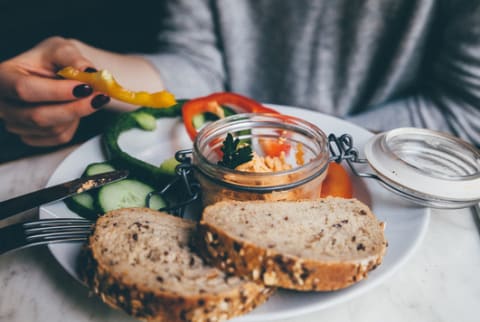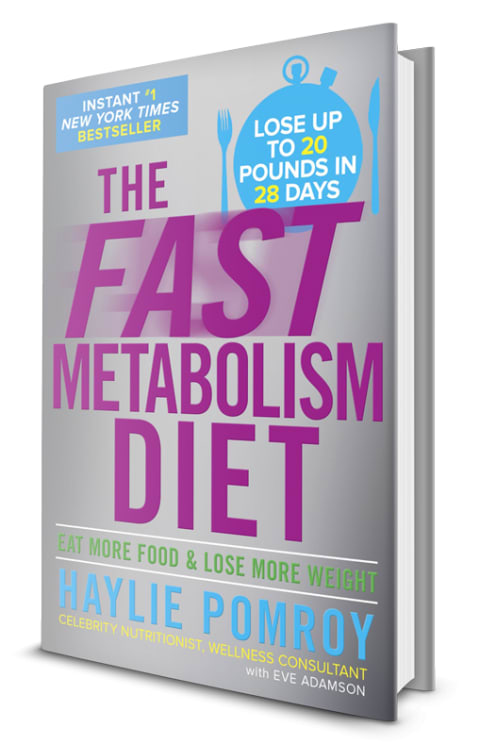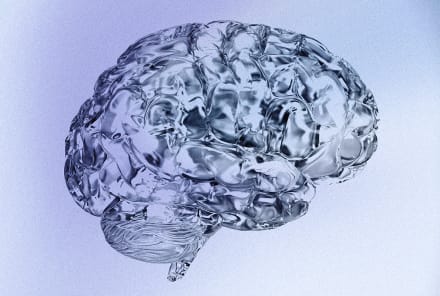Advertisement
Yes, You Can Manipulate Your Metabolism To Lose Weight. Here's How

Weight loss is more complicated today than it used to be. The simple equation of using more energy than you consume is now one layer of the larger picture, which now includes hormones, stress, and toxins.
Thankfully, metabolism is a process—not a thing—that responds to inputs. These tips from Haylie Pomroy's book, The Fast Metabolism Diet: Eat More Food & Lose More Weight, will show you how to manipulate your metabolism to prime your body to finally shed excess weight.
1. Understand the relationship between toxins and weight gain.
We are asking more of our bodies than at any other time in the history of civilization. We ask them to live on food that is of a much lower quality than ever, thanks to all the chemical additives, preservatives, and processing. We pump ourselves full of sugar and artificial sweeteners, hormone-riddled dairy products, and foods like wheat and corn and soy that are so genetically modified, it's a wonder we can even digest them. We live in a world with depleted soil, polluted air, and water teeming with environmental chemicals. We eat and drink from plastic containers that leach even more chemicals into our foods and drinks. And we live with great amounts of often crushing, overwhelming stress.
2. Stop dieting. You'll gain more weight every time.
The foods you eat and the lifestyle you choose should create energy and strength for you, not fatigue, obesity, sickness, desperation, or self-loathing. Yet once you've slowed down your metabolism, study after study has demonstrated that the metabolic rate does not easily return to normal, even after resuming a normal diet.
When you starve yourself, your body adjusts to subsist on a smaller number of calories by slowing down your metabolism. That means that whenever you go off your diet, you're likely to gain weight with a vengeance. Your body is just trying to save you from future famine.
3. Train your body to stop making toxins.
When you are under tremendous stress, your body excretes crisis hormones signaling it to store fat and burn muscle. When you are overloaded with chemicals, pesticides, and pollutants, the body creates new fat cells to house these toxins, so you don't become poisoned and sick. And when you consume food that is devoid of nutrients or contains artificial dyes, flavorings, and sweeteners, the body does its best to survive these foreign substances by slowing down the metabolism and minimizing the damage to the body's system as a whole. The very world we live in puts us all at risk for a slow metabolism
4. Make friends with food by using it as a tool.
We're about to change all that. It's time to move beyond blame and regret and self-loathing and into the future. This is the paradigm shift your body needs, and it will create a new, healthier version of you. The new you views food as a tool to repair damage and restore health. The new you loves fruits and grains and protein and healthy fats. The new you knows how the body reacts to specific foods and strategic eating, and the new you has all of the resources to get the weight off and keep it off for good.
If food has been your enemy in the past, that's all over. Now, we're stepping into your future, where food is your medicine. Even if you're 10 to 20 pounds overweight, you need this medicine. You need to learn how to unwind stress, unlock fat, and unleash your metabolism.
5. Treat your metabolism like an ongoing process, not an object.
Specifically, the metabolic process consists of chemical reactions that occur in the cells of all living organisms to sustain life. It's the change or transformation of food into either heat and fuel or substance (muscle, fat, blood, bone). At any given moment, your metabolism is either burning, storing, or building.
You have a metabolism because you are alive, and life requires energy. We all need energy to survive—to breathe, move, think, and react—and the only way to acquire this energy is from the consumption and metabolism, or transformation, of food. Profound! We need fuel, and we need substance. A healthy metabolism and a functional metabolism allow us to have just the perfect amount of energy available, an appropriate amount of reserve energy stored and ready for use, and a strong and stable structure (the body).
6. Manipulate your metabolism with the right combinations of good food and movement.
Remember, your metabolism is your body's system for dealing with the energy you take in through food. The metabolism shuttles that energy into different directions according to what you eat and what you do. The beauty of your metabolism is that it can be manipulated, because how you eat and move and live affects how much of your food is stored as fat, how much is used as energy, and how much is devoted to building the structure that is your body.
This manipulation is what I learned about when I studied animal science. The animal science industry uses this knowledge of energy, storage, and structure to create livestock that is ideally proportioned for use as food, to the tune of billions of dollars of profit.
7. Live by this rule: Your body is a product of the environment you make for it.
The metabolism can also get you into trouble because you can inadvertently manipulate it to create a body you don't want. Dieting, nutrient-void foods, and living with too much stress slow down your metabolism when it should be sped up. When you gain weight, feel blah, even get sick with a chronic disease, those are all coping mechanisms your body creates in response to your actions or environment, like the frogs that grow three legs in polluted swamps. Your butt or your belly could be protruding because of the very environmental, emotional, and biochemical ecosystem in which it is dwelling.


Study Shows This Vitamin May Lower Your Risk Of Alzheimer’s By 17%
Molly Knudsen, M.S., RDN

These Are The Two Most Important Factors For Building Muscle
Molly Knudsen, M.S., RDN

Study Shows This Vitamin May Lower Your Risk Of Alzheimer’s By 17%
Molly Knudsen, M.S., RDN

These Are The Two Most Important Factors For Building Muscle
Molly Knudsen, M.S., RDN

















